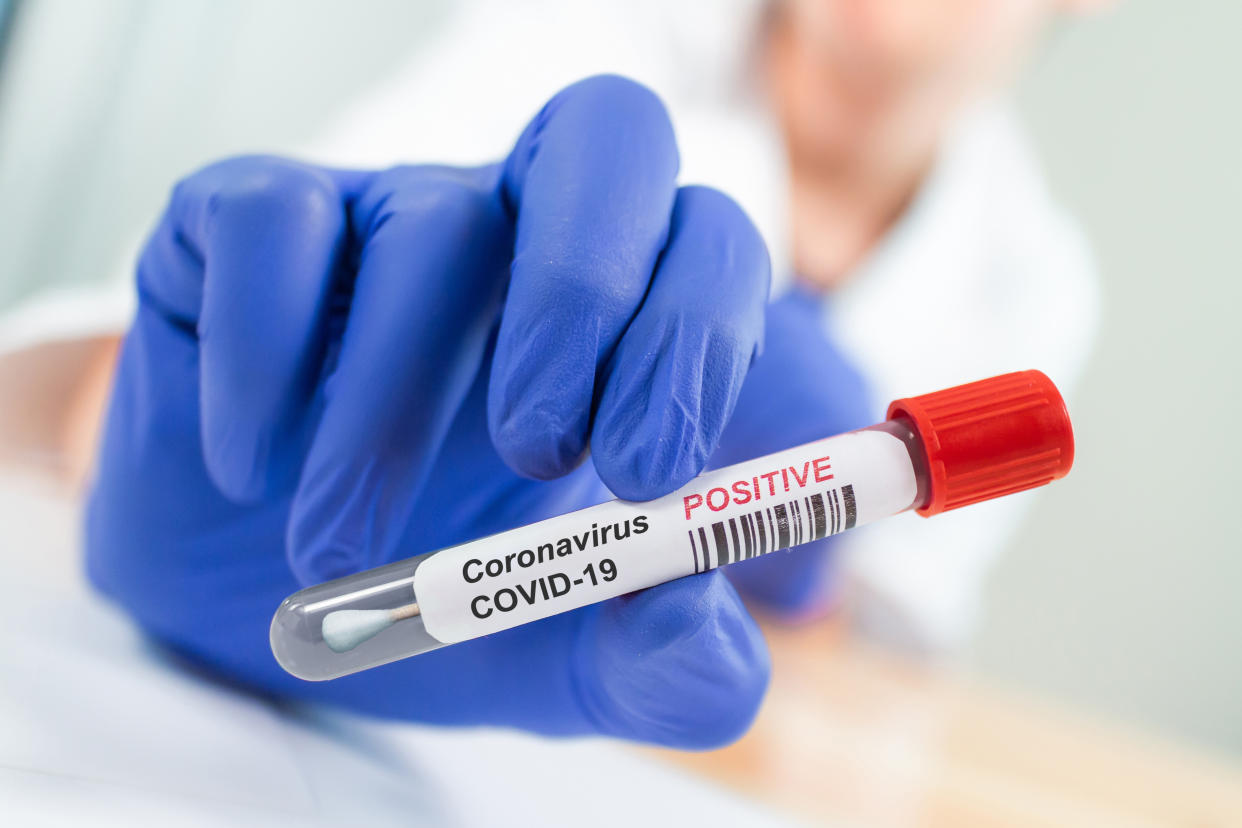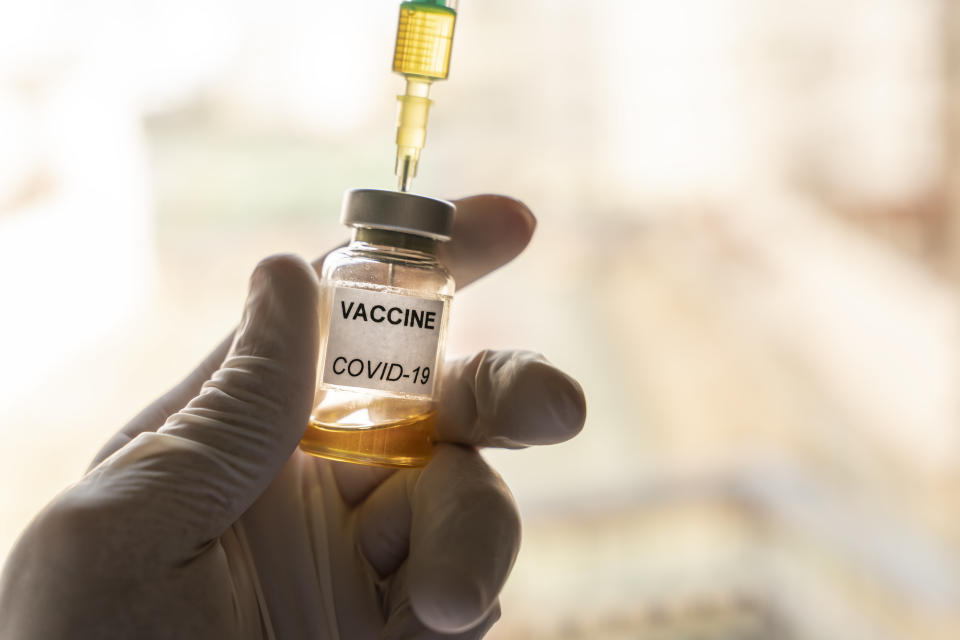Man tests positive for coronavirus twice in US' first confirmed reinfection case

Scientists have confirmed the first known coronavirus reinfection case in the US.
An unnamed 25-year-old man from Washoe County in Nevada tested positive for the infection twice within 48 days, with swabs coming back negative in-between.
The second infection was more severe, with the man requiring oxygen in hospital.
With the patient now recovered, scientists from the University of Nevada stressed prior exposure to the coronavirus may not guarantee immunity, highlighting how everyone must adhere to pandemic restrictions.
Read more: 3 million Britons missing out on cancer screening amid coronavirus
This is the fifth known reinfection case globally, with patients previously testing positive on two separate occasions in Belgium, the Netherlands, Hong Kong and Ecuador.
One expert called the case study “very concerning”, while others worried what a waning immune response may mean for vaccine development.
Several pointed out, however, just five confirmed reinfection cases have come to light, out of more than 37 million known coronavirus incidences since the outbreak was identified.
Watch: Can you get coronavirus again if you've already had it?
The vast majority of people who overcome the coronavirus are thought to have some immunity against a second infection, at least for the first few months.
While only five confirmed reinfection cases have been identified, the Nevada scientists worry many more may have been missed, particularly if a patient is asymptomatic first time round.
Widespread immunity via an effective vaccine has long been hailed a route back to life as we knew it. A potentially waning immune response is therefore a concern and cause for future research.
Read more: Wash face coverings every day at 60C

“There are still many unknowns about [the coronavirus] infections and the immune system’s response, but our findings signal a previous infection may not necessarily protect against future infection,” said lead author Dr Mark Pandori.
“It is important to note this is a singular finding and does not provide generalisability of this phenomenon.
“While more research is needed, the possibility of reinfections could have significant implications for our understanding of COVID-19 [the disease caused by the coronavirus] immunity, especially in the absence of an effective vaccine.
“It also strongly suggests individuals who have tested positive for [the coronavirus] should continue to take serious precautions when it comes to the virus, including social distancing, wearing face masks and hand washing.”
Watch: What is long COVID?
The man first swabbed positive for the coronavirus at a community testing centre in April after developing a cough, fever, sore throat, nausea and diarrhoea.
Otherwise healthy, the man recovered while isolating, with two separate swabs carried out in May coming back negative, the scientists wrote in The Lancet Infectious Diseases journal.
Read more: Lockdown could trigger 'surge' in PTSD
His initial symptoms returned, however, on 31 May. Five days later, the man saw his GP complaining of breathlessness.
The patient was sent to A&E after tests revealed his oxygen levels were dangerously low. While in hospital, he tested positive for the coronavirus again.
‘We’ve only seen a handful of reinfection cases’
Of the five known reinfection cases, only the Nevada and Ecuador patients went on to have more severe complications the second time round.
The scientists wondered whether the patients encountered a higher dose of the virus on re-exposure.
They may also have been infected with “a version of the virus that was more virulent or more virulent in this patient’s context”.
Antibody dependent enhancement could also have been at play. This occurs when antibodies – proteins that are usually released after an infection to prevent it taking hold again – work in an infection’s favour.
The phenomenon can enhance the entry of a virus into cells and even aid replication. This has been observed with other strains of the coronavirus class and dengue fever.
The man was found to produce coronavirus antibodies after the reinfection, however, these were not tested for the first time round.
“We need more research to understand how long immunity may last for people exposed to [the coronavirus] and why some of these second infections, while rare, are presenting as more severe,” said Dr Pandori.
“So far, we’ve only seen a handful of reinfection cases, but that doesn’t mean there aren’t more, especially as many cases of COVID-19 are asymptomatic.
“Right now, we can only speculate about the cause of reinfection.”
Read more: Coronavirus in woman’s eyes after testing negative for infection
The scientists pointed out it is highly unlikely the virus reactivates in the body, with that requiring a mutation rate that has not yet been observed.
With many patients experiencing just mild symptoms, or even none at all, it is difficult to study coronavirus reinfection rates, they added.
“Overall, there is a lack of comprehensive genomic sequencing of positive COVID-19 cases both in the USA and worldwide, as well as a lack of screening and testing, which limits the ability of researchers and public health officials to diagnose, monitor, and obtain genetic tracking for the virus,” said Dr Pandori.
Writing in a linked editorial, Dr Akiko Iwasaki from Yale – who was not involved in the study – added: “As more cases of reinfection surface, the scientific community will have the opportunity to understand better the correlates of protection and how frequently natural infections with [the coronavirus] induce that level of immunity.
“This information is key to understanding which vaccines are capable of crossing that threshold to confer individual and herd immunity.”
Other experts were concerned to hear of the reinfection case, but stressed the phenomenon appears to be rare.
“I think most of us have thought reinfection with COVID-19 was likely to become common as individuals’ immunity levels declined post infection,” said Professor Paul Hunter from the University of East Anglia.
“However, the findings in the paper are very concerning both from the point of view of the very short time between the two infections and the fact the second illness was more severe than the first.”
Professor Hunter added, however, we know of just five confirmed reinfection cases out of millions of incidences.
“We would have expected to have heard of many more incidents if such very early reinfections with severe illness were common,” he said.
“Nevertheless, repeat infections do occur with different strains and I suspect many more will be found over coming months as immunity declines in individuals after infection.
“It is too early to say for certain what the implications of these findings are for any immunisation programme, but these findings reinforce the point we still do not know enough about the immune response to this infection.”
Dr Simon Clarke from the University of Reading agreed, adding “initial over-confident predictions” that coronavirus survivors could not get reinfected were “opinions rather than facts”.
“It is becoming increasingly clear that reinfections are possible, but we can’t yet know how common this will be,” he said.
“It might prove to be a rare phenomenon, but it’s equally possible these could be the first few cases and there are many more to come.
“If people can be reinfected easily, it could also have implications for vaccination programmes as well as our understanding of when and how the pandemic will end.”
Professor Brendan Wren from the London School of Hygiene & Tropical Medicine, stressed, however, “given the millions [of] cases worldwide, these small examples of reinfection are tiny and should not deter efforts to develop vaccines”.
Watch: How is severe coronavirus treated?



